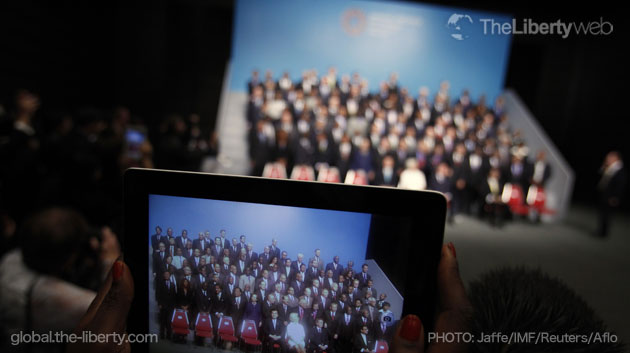The IMF Should Fight Against China’s Manipulation of Exchange Rate Policy:
Break Away From the Route of Austerity
IMF annual general meeting. The true challenge is not one of ‘financial consolidation’, but is one of creating growth measures and stopping China’s exchange manipulation. Photograph: Stephen Jaffe/IMF/Reuters/Aflo
At an annual general meeting of the IMF (International Monetary Fund) held in Tokyo in October, concerns about the global economic slowdown were addressed and the joint declaration included the following sentence “It is necessary to ensure a sustainable recovery from the crisis.” The reason behind this allowance was that, in addition to the European crisis, a danger exists for America to fall back into a recession from next year due to tax increases and spending cuts, thus increasing the possibility of a global recession.
The IMF has been forcing countries to revitalise themselves financially through the pursuit of austerity measures such as increasing taxes and cutting budgets, so it can be appreciated that an awareness of the issue of an economic slowdown has begun to be recognized. On the other hand, the message that “fiscal revitalisation should be carried out to an extent as long as economic growth is not impaired” is an indication of unavoidable indecision.
The Logic of the IMF ‘Accountant’
Since the IMF was established with the aim of helping a country that had defaulted on the payment of national debt, it tends to be driven by an accountant’s mindset of reducing all debt and bad loans. However, if the only thought in an economic climate with a lack of demand where fewer people and companies are spending money is about reducing the debt of the government and banks, nobody will spend any money, and the economy will become increasingly sluggish.
According to the IMF’s logic, there is fear that a global recession could be caused from overall, sluggish economic activity. The slowdown of the world economy is becoming significant now, so the message should be of strong economic growth rather than financial revitalization.
If the private sector does not want to spend money due to a bad economy, first the government should proactively create a money flow by investing in infrastructure and so forth. It must be noted that Greece and Spain, who have carried out austerity measures, have had their economies deteriorate, which in turn has worsened their debt problems.
The IMF claims that Japan’s 10% consumption tax increase is not sufficient to revitalise its finances. However, increasing taxes under the deflationary recession would choke the Japanese economy.
The IMF should recognise the current status of the global economy. It is falling into a depression. The IMF should alter its recommendation for austerity measures. In addition, it should promote a proactive financial policy and monetary easing in order to allow every country’s economy to recover.
Put an End to the Weak Renminbi Policy
In addition, at the annual general meeting, a question was raised on whether China, with the world’s second largest GDP, would want to take responsibility for counterbalancing. Chinese officials boycotted the meeting in protest of Japan with regard to the Senkaku Islands issue. Participants from each country expressed their criticism, because China was absent from the meeting. However, the Chinese officials still demanded an increase in their voting rights at the IMF.
China’s exports have been at an advantage due to the national policy of maintaining a weak renminbi rate. This issue was mentioned in the U.S. presidential campaigns. There was an analysis that reported the renminbi has been kept 20% to 30% cheaper than it should have been when compared with the floating exchange rate system.
The international community should force China to put an end to its currency manipulation and to compete fairly with other countries as the Chinese economy has increased so much in scale. It should also be remembered that China has become a threat to neighbouring countries. It has significantly expanded military capability as a result of the investment of funds, earned through exports, in the military sector.
However, the IMF has softened its criticism of China with its most recent statement, in its June report, that the renminbi “is moderately underrated” compared with the previous “substantially underrated” status evaluation.
The IMF should force China to abandon its current exchange rate policy, bearing in mind that its exchange manipulation is unfair. The money, gained from it, is used for military purposes, and it is thus a threat to the security and prosperity of other countries.
Related
- Protecting the Banking Systems Alone Will Lead to a Great Depression
It’s related to my lecture about the IMF and the EU fiscal policy today. When I look at them, I feel like they are just protecting the banking system of the EU or other countries. However, the banking system is not the economy itself. To protect the banking system does not equate to the protection of a good economy,...



















